“The Chumburus and Kombobas weren’t seeing eye to eye. They could barely sit together for any meeting for up to 30 minutes. The rivalry was intense,” Joseph said.
Bakamba is a remote farming community in the Kpandai District of Ghana. Two main tribes in the community were in conflict with one another for several decades. Their disputes would arise over land ownership and water usage, leading to violent confrontations and deep-seated animosity, which made life difficult for everyone in the community.
Gender tradition is deeply rooted in this community. “Women are fully responsible for the house and the children’s needs,” a member of the community expressed proudly.
However, in 2020, a project called the “4R Nutrient Stewardship Project,” which is a partnership between the Co-operative Development Foundation of Canada, Fertilizer Canada, and Global Affairs Canada, arrived in the community to improve the socio-economic well-being of smallholder farmers. Initially, the tribes hesitated to work together, but they soon realized their co-operation was crucial for the project’s success and for their mutual benefit, so they have begun to compromise. The project formed a co-operative comprising both tribes. In addition, they formed the Village Savings and Loans (VSLA) amongst the co-operative and established a demonstration field in the community.
As a result, the people of Bakamba were compelled to hold their weekly VSLA meetings and monthly co-operative meetings to discuss the activities of the project. This was a requirement from the project and it “compelled” them to meet regularly, which was rare in the community of Bakamba.
Several months passed and the project engaged the people of Bakamba in the project activities; down streaming climate-smart agricultural approaches through demonstrations, regular farmer field visits by the project team, VSLA, and co-operative as well as training. Over time, they began to see the benefits of working together and sharing knowledge.
Slowly, their cohesion during group meetings and field days began to improve. The leadership of the co-operatives was selected from both tribes and their discussions during co-operative meetings began to go beyond just matters of the project but how they could improve their community needs and their livelihood.
In the third year of the project in Bakamba, members of the co-operative started active savings through the VSLA approach and members from both tribes started accessing loans for their economic benefit. They began to see each other as allies rather than adversaries.
Samson’s Inspiring Pharmacy Venture
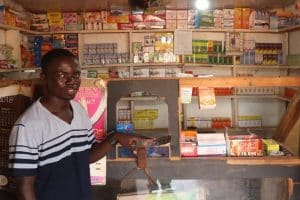 Sampson Naja is a high school graduate from Nchuman Senior High School. While in school, he worked on a part-time basis as a chemical (pharmacy) shop attendant where he was trained in dispensing medications to patients. He completed school in 2019 with no hopes of furthering his education due to financial limitations. However, he managed to join the co-operative and later accessed a loan of GHC3000 (CAD $349). He traveled to Accra, the capital of Ghana, and accessed some medication, which he brought in and started selling on a tabletop during Kumdi market days. His venture was flourishing because there wasn’t a single drugstore in his community or nearby communities. He went on to partner with a licensed chemical (Pharmacy) shop owner to open a branch in his community. He later built a structure and moved in there and paid back his loan.
Sampson Naja is a high school graduate from Nchuman Senior High School. While in school, he worked on a part-time basis as a chemical (pharmacy) shop attendant where he was trained in dispensing medications to patients. He completed school in 2019 with no hopes of furthering his education due to financial limitations. However, he managed to join the co-operative and later accessed a loan of GHC3000 (CAD $349). He traveled to Accra, the capital of Ghana, and accessed some medication, which he brought in and started selling on a tabletop during Kumdi market days. His venture was flourishing because there wasn’t a single drugstore in his community or nearby communities. He went on to partner with a licensed chemical (Pharmacy) shop owner to open a branch in his community. He later built a structure and moved in there and paid back his loan.
A nearby community (Najoro) has a chip compound (health center) that doesn’t have a drugstore to serve patients. The authorities reached out to him to set up a branch there so he could serve their people. He then again accessed a loan from the co-operative to access more medications for the new shop at Najoro.
“This is only possible because of the co-operative, if not for the project I am not sure what I would have been doing. I am now saving for school,” Samson said.
Samson wants to study pharmacy at the university and is saving towards it.
The 4R co-operative has enhanced businesses in the community of Bakamba. Almost every household in the project co-operative is into a trade aside from farming.
Brewing Hope
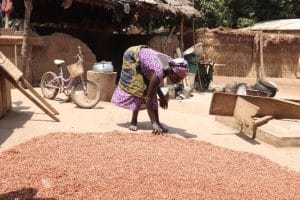
Gmafame drying her guinea corn to brew her Pito.
Gmafame Tignangin is a 65-year-old widow living with her 24 grandchildren. Her main source of livelihood was a pito brewery and a little assistance from her children.
Before the project, she brewed pito occasionally because she could not afford to have it brewed every day. She sometimes brewed it once a week but since the project’s inception, she can access a loan to buy her guinea corn to brew every day. She was very excited to share her experience.
“Since my husband passed on it would have been hard if not for the co-operative VSLA. This business would eventually collapse. I get no support from anywhere for this business.”
She uses the proceeds from her pito business to look after her grandchildren and her last born’s school needs.
Business Expansion in Bakamba
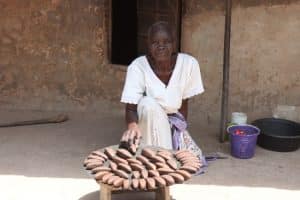
80 year old Tajaame molding her Dawadawa for sale.
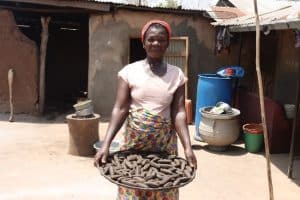
Yaa holding a portion of her Dawadawa ready for sale.
Batimbe Yaa is a mother of eight, and through the co-operative, she has expanded her dawadawa production. Dawadawa is a natural spice used for stews and soup in Ghana. She and her household have taken the production of dawadawa seriously and now exports it to the capital (Accra) for her daughter to sell. Through this business, her mother-in-law Tajaame, who is 80 years old, earns an income and does not rely on anybody for financial support. She saves GHC50 (CAD $6) every week in her co-operative VSLA savings.
Co-operatives bring unity to Bakamba
Peace seemed like a complex word for the two fractions of Bakamba until working together provided nothing but economic and production benefits for the members of the group.
The chairperson of the Bakamba co-operative also shared his experience.
“My three wives always had misunderstandings. They mostly quarreled every week. You can imagine the stress of living in my house. Since the inception of this project, they are all engaged now. My first wife got the project-assisted tricycle, which is working for her, my second wife is currently into soap making and the last one is into the sale of yam. They are all busy. The little time they get, they use it to talk about their business and bond. I then realized indeed, “idle hands will bring you nothing but trouble.”
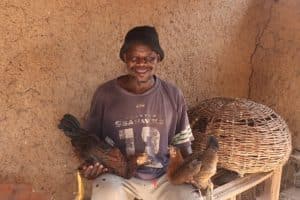
Dinyung getting his fowls ready for Kumdi market.
Dinyung Nfrib and his wife Nfrib Niena expressed their joy the unity the project has brought to their community.
“Unity is the reason we have enough money to borrow and take care of our needs. Unity is the reason we would not go around telling people our problems because we need help,” Dinyug expressed.
In addition to farming maize and yam, Dinyung also now sells fowls during Kumdi, Lungni, and Kpandai market days. He can boast of having over 50 fowls. He added, “the essentials this project has brought to our community we will never let go of.”
His wife on the other hand is the treasurer of the 4R co-operative at Bakamba. She is also a beneficiary of the subsidized motor-tricycle. She told the team she doesn’t have financial challenges like before. Now she provides for her children in school and goes into other ventures. She makes dawadawa to sell and processes casava for sale in bigger markets.
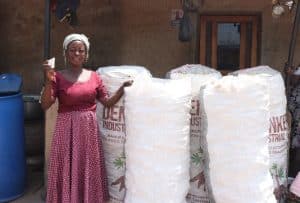
Niena standing next to her bags of dried casava ready for sale.
Sanya Akua, the daughter of the chief of Bakamba, was into local soap making popularly known as “Azumah blow” in Ghana. She recounts when she could only afford one “jerican” of oil for ingredients for her business, but through the co-operative, she is able to afford three “jericans” to increase her production. Each ball goes for GHC10 (CAD $1.20) and now she can sell more than 60 pieces in a week, especially during market days.
The chief of Bakamba, Sanya Kwaku added, “This project has brought unity. Now the Chumburus meet every week with the Komkombas and farming has become more effective in their community.”
The 4R project has not only improved their farming practices but also helped to break down the barriers that had separated them for so long. The tribes now organize community engagements together, where they discuss challenges facing the community and find collective solutions to address them. They have started to help each other with farm work and even shared resources, such as water and tools.
In addition, the deep-rooted traditional gender norms are beginning to break in some households as some men now help their wives in the house with business, cooking, carrying of firewood and some other chores. Some members of the group have become proud gender model families.
In the last farming season, the co-operative acquired farm chemicals and sold them to its members at subsidized fees and sold the remaining stock to people outside the co-operative.
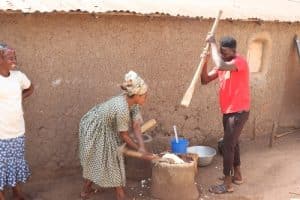
Joseph pounding fufu (food) with his wife.
The Kinyobgn (Kanokonko) co-operative is a success. They have currently made savings from their social fund and are in the process of acquiring a grinding mill that cost GHC10,200 (CAD $1,186) to serve the co-operative and the community because women struggle a lot and spend the entire day at the community grinding mill.
The tribes in the community now live in harmony. They no longer fight over trivial matters, and instead, work together to achieve common goals. The success of the co-operative has also inspired other nearby communities to come together to form similar initiatives. The Bakamba community has embraced the training provided by the 4R project in aspects of co-operative enhancement, gender model family, women sales agents, 4R principles of farming amongst others. Most women in the community have proven to be very industrious since the formation and rollout of the 4R co-operative in the Bakamba community.
Thanks to the intervention of Global Affairs Canada, the tribes in the farming community of Bakamba have overcome their differences and live in peace and prosperity.